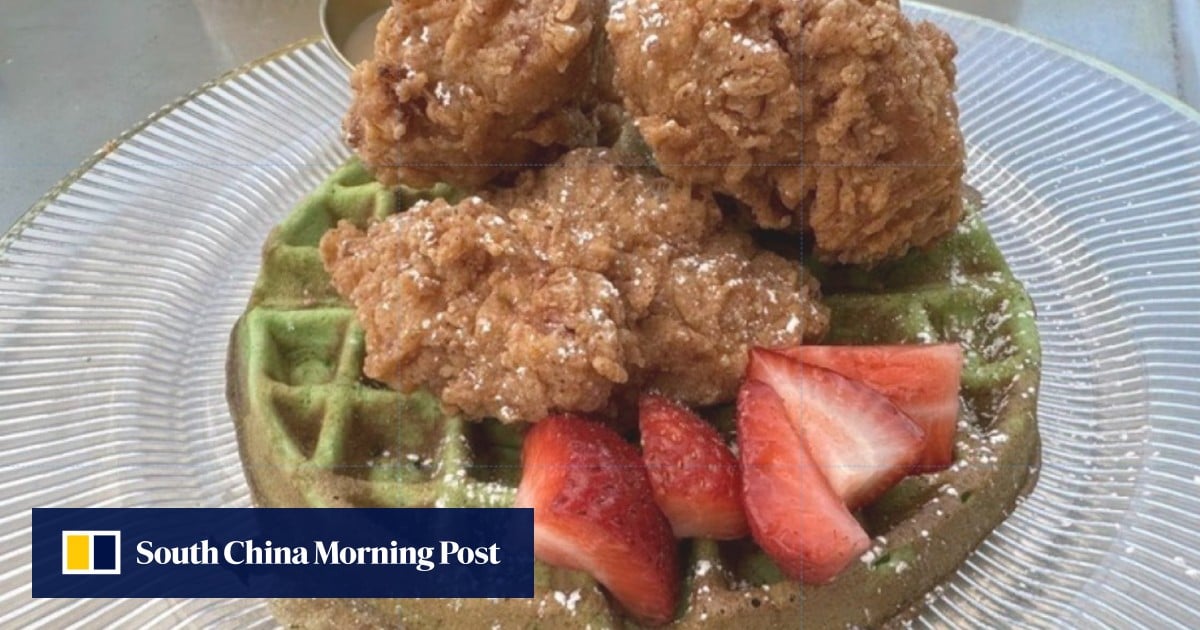The menu at Breaking Dawn is a marriage of Asian and American flavours that owner Liz Truong designed based on her daughter’s favourite foods.

“I think food creates memories, food creates conversations,” Truong says. “So I created a place where I took the most important foods in different cultures and that’s why it’s called fusion.”

But putting an Asian spin on brunch does not just mean adding something on the side. It is often a complex balancing act incorporating diverse flavours.
Breaking Dawn is one of two places serving Asian brunch that opened in the San Francisco Bay Area in spring 2023. The other is Taste and Glory, in San Mateo, which was inspired by owners Nattacha “Phin” Lerspreuk and Thanasit “Toto” Nanthasitsira’s visits to Thailand.
Both restaurants are popular among the abundance of Asian-American-owned places serving comfort food in the region.

One of Taste and Glory’s bestselling dishes is Tom Yum Scramble. For this, tom yum soup made with lemongrass, galangal and kaffir lime leaves forms the base of a sauce in a croissant sandwich with scrambled eggs, Dungeness crab, tomatoes, mushrooms, onion and Swiss cheese.
Lerspreuk says she accepts some people may frown at her ingredient mash-ups.
“I just want to do something new and something different,” she says.

“We look at seasonality, we look at what people would like. And then we look at Filipino-American influence too,” he says.
Jessica Nguyen, 28, a customer at Breaking Dawn, says she almost always chooses Asian brunch over traditional American eggs and waffles, as the taste and the ambience make the higher cost worth it.
“When I try Asian brunch ‘fusion’ spots that are starting to become popular, I get excited about seeing how they make the food – how they combine the food,” she says.
Brunch might be a Western concept, but a midmorning meal is customary in many Asian cultures, according to Martin Manalansan, co-editor of Eating Asian America, a book about how conceptions of Asian-American food have been shaped.
It’s all about leaving a legacy. It’s all about sharing my experience
Dim sum, being typically eaten at brunch time in mainland China, Hong Kong and Taiwan, is a good example.
In the United States, Asian-American chefs are catering to a contemporary dining scene with diners who enjoy decadent breakfast food with a cocktail thrown in. They are “reappropriating or reconfiguring food” on their terms, Manalansan says.
“Brunch is so mainstream,” he adds. “It’s not just the food itself, but really expanding ideas of what is good and appropriate at a certain time and a certain meal.”
There is a long history of derision of Asian foods, from negative stereotypes surrounding Chinatown restaurants in the 1800s to, a century later, children being taunted in school cafeterias for the “smelly” food in their lunchboxes.
Over the past few decades, Asian and Asian-American cuisine has become more popular, thanks in part to increased media exposure.

Eric Silverstein, founder of restaurant chain The Peached Tortilla, which has various locations around Austin, Texas, introduced a brunch menu a few months after opening his first location in 2014.
The dishes Silverstein – who is half Chinese – puts on the menu are reflective of his childhood, which was spent in Tokyo and then Atlanta, Georgia.
Silverstein says one of his Asian friends used to assure people The Peached Tortilla was “a great gateway drug” to Asian flavours.
“You want to be creative but, at the end of the day we’re also trying to run a business,” Silverstein adds. “You don’t want to go too crazy and then alienate your customer base either.”
The restaurateur, whose establishments also open for dinner, advises others in the industry to focus on more than just brunch if possible.
Truong, whose Breaking Dawn is part of a “dual concept restaurant” (the space transforms into First Born restaurant at night with a different menu and head chef), does not see other restaurants serving Asian brunch as rivals. In fact, she has given advice and tours of her restaurant to other restaurant proprietors.
“It’s all about leaving a legacy. It’s all about sharing my experience. I think if they’re good and they’re busting their butt and they’re working, they deserve support as well,” she says.

